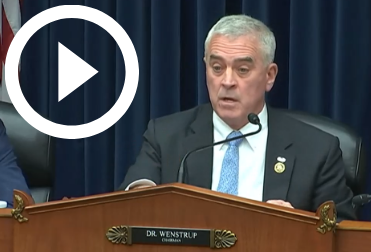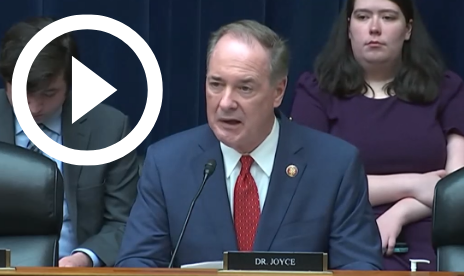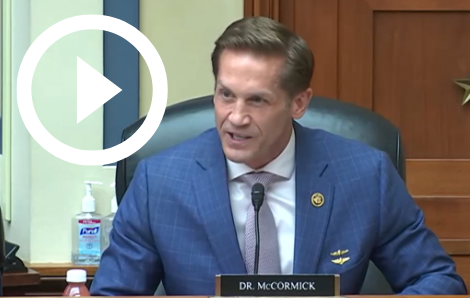Hearing Wrap Up: Director of White House’s Office of Pandemic Preparedness and Response Policy Testifies for the First Time
WASHINGTON — The Select Subcommittee on the Coronavirus Pandemic held a hearing titled “Examining the White House’s Role in Pandemic Preparedness and Response” to discuss the Office of Pandemic Preparedness and Response Policy’s (OPPR) role in responding to and preventing future pandemics. The newly appointed Director of OPPR, Major General Paul Fredrichs, explained that the office’s main purpose is to convene pandemic preparedness and response groups from across the federal government and integrate their ideas into a comprehensive pandemic response plan. Members asked Maj. Gen. Friedrichs about OPPR’s approach to addressing supply chain issues, avoiding bureaucratic roadblocks, and bringing together public health agencies. Within the first year of operation, OPPR is required to submit a forward-looking, pandemic preparedness report to Congress and the President. The Select Subcommittee looks forward to receiving a copy of this report and further evaluating the necessity and functionality of OPPR.
Key Takeaways:
- According to Maj. Gen Friedrichs, the White House’s OPPR is working to convene and integrate efforts across federal departments and agencies, not to duplicate responses or add needless bureaucracy.
- OPPR has only existed for seven months. Its ability to address a future pandemic and the necessity of its convening authority has yet to be tested.
- OPPR is implementing strategies to enhance America’s supply chain production of personal protective equipment (PPE) and has hired experts to evaluate the best course of action.
- Director Fredrichs testified that he understands that America cannot allow bureaucratic barriers to inhibit future pandemic response and that he will work to ensure that OPPR will not become a bureaucratic cog in the wheel.
- The Select Subcommittee will stay involved in the process, continue to monitor the efforts of OPPR, and work with Director Friedrichs to ensure America is prepared to defend against a future pandemic.
Member Highlights
Select Subcommittee on the Coronavirus Pandemic Chairman Brad Wenstrup (R-Ohio), D.P.M, elicited a commitment from the Director of the White House’s Office of Pandemic Preparedness and Response Policy to take a “whole-of-government” approach during future pandemic responses.
Chairman Wenstrup: “We talk about a whole-of-government response. Do you think your office will have the ability to break some of those silos that tend to exist sometimes within our government, in an attempt to bring them all together?”
Major General Friedrichs: “That is absolutely my commitment. In a good faith effort, collaboratively, transparently, and inclusively to leverage the convening authority that we have to bring the key stakeholders within government together. And we were clearly charged to do that in the bipartisan language that created this office. The success will be judged by what happens in the next pandemic. And so I don’t want to overstate what we’ve done in the last seven months, but I am grateful for our colleagues across the federal government who have partnered with us and who have recognized the opportunity, as you said, to break down those stovepipes and find better ways to work together so that we’re better prepared for future events.”
Rep. Nicole Malliotakis (R-N.Y.) discovered that the White House’s new Office of Pandemic Preparedness and Response Policy is implementing strategies to enhance supply chain production of personal protective equipment (PPE). She also argued that the United States needs to halt reliance on China for this PPE.
Rep. Malliotakis: “During COVID, there were a lot of things that were wrong with regards to not having enough PPE, ventilators, hand sanitizer, pharmaceuticals, and we face this issue now, not even with the pandemic. We know that the U.S.A. has a shortage of 250 pharmaceutical drugs, including chemotherapies, including antibiotics. We know that we rely on India and China for active pharmaceutical ingredients that make up about 70% of our generics. So, whether it’s a pandemic or just everyday life, I think we need to be doing more to ensure that we’re having adequate supply of our necessary drugs and that we’re producing those active pharmaceutical ingredients here in the United States, not depending on communist China for them. And so my question is, how are you working in a cross section, perhaps with HHS or other agencies, to address this issue?”
Major General Friedrichs: “You’re absolutely right that we need to understand our supply chains.
“I’m very pleased to share with you that we’ve brought on board some subject matter experts to our team, specifically to help integrate those efforts on medical supply chain, in support of that broader supply chain effort across the whole of government.”
Rep. Malliotakis: “I really urge you, the administration, to make this a priority. I mean, it seems like you’re already working on it, but we really need, I think, to take appropriate steps to get that supply going here in the United States.”
Rep. John Joyce (R-Pa.), M.D., ensured that the Director of the White House’s Office of Pandemic Preparedness and Response Policy is committed to knocking down bureaucratic barriers in pursuit of a fulsome pandemic preparedness effort.
Rep. Joyce: “The COVID-19 pandemic revealed deficiencies in our biodefense that must be remedied. The OPPR is charged with taking steps to prepare and coordinate with relevant agencies to address the next biologic threat that we might face. While there are benefits to working proactively to ensure the federal government stands ready in the face of biological incident, it is important that we do not allow bureaucratic barriers to inhibit that much needed response. Dr. Friedrichs, how can the OPPR balance its mission of proactively putting systems in place to respond to a biologic incident with the need for flexibility within those systems to respond to different types of future threats?”
Major General Friedrichs: “I believe and I commit to you and to everyone in this committee that we will continue to bring value through that convening authority that we have so that we can have those ongoing proactive discussions and be better prepared for the next biological incident.”
Rep. Mariannette Miller-Meeks (R-Iowa), M.D., inquired about the Office of Pandemic Preparedness and Response’s role in an already robust biodefense system and discovered that OPPR’s Director seeks to convene pandemic preparedness and response ideas and organizations, not duplicate existing efforts.
Rep. Miller-Meeks: “How will you ensure that the efforts made by OPPR, and this is my concern, will not be duplicated by other agencies such as the CDC or ASPR or the FDA or the NIH or HHS? All of these agencies have input.”
Major General Friedrichs: “We do not have contracting authority, nor do we have the funds to do that, so we will not be a contracting agency competing with ASPR. We don’t perform bench research, so we will not be competing with the NIH. We are not the public health experts at CDC, and we will not be competing with CDC. What we are is the conveners that bring all of those groups together — as well as the leaders of the national labs and the Department of Energy and the labs at the Department of Defense and the people who are working on contracting and DOD and DHS and VA and other federal agencies. So regardless of the topic that you describe, what we bring to the discussion is the ability to convene and to integrate efforts across departments and agencies, not to duplicate, but to identify where there’s opportunities to better synchronize and integrate what we’re doing across the whole-of-government and with our state, local, tribal, and territorial partners, industry partners, academic partners, and others who share our commitment to mitigating risk.”
Rep. Rich McCormick (R-Ga.), M.D recognized the importance of prioritizing individual autonomy and the doctor-patient relationship when America faces a future health crisis.
Rep. McCormick: “Moving into the future, and as an E.R. physician, I appreciate you recognizing that a lot of us had burnout during this last three or four years from the pandemic where we’re doing our very best and we’re trying to make our case as to how to treat a patient based on our best ability to understand something that nobody had ever seen before. And witnessing thousands of patients that were being treated and then being told by a government person, whether they be a physician or whatever, somebody who thought they knew better than me, who was treating thousands of patients, how to treat the patient. Then saying, I’m going to censor you. I’m going to tell you you’re wrong. Even though they hadn’t treated one patient. That’s one of the things that you mentioned as far as the burnout and being underappreciated for what we were trying to accomplish, which is ultimately to take care of that person we’re holding the hand of while they may be dying.”
###




